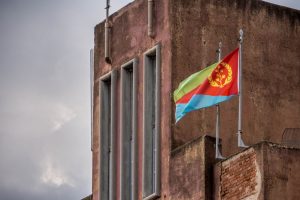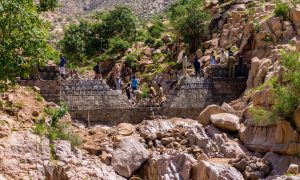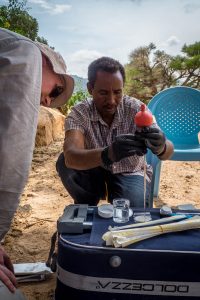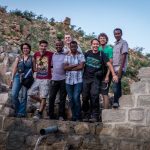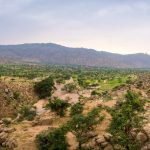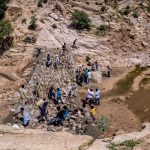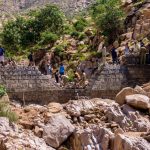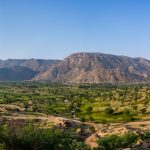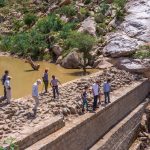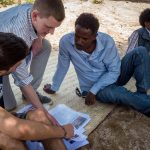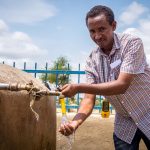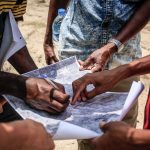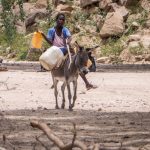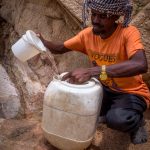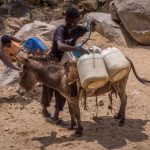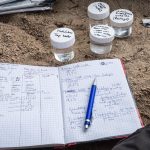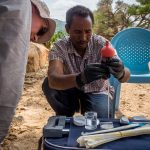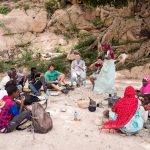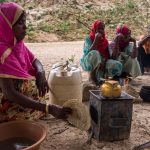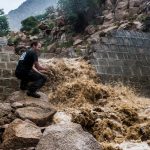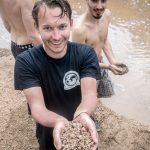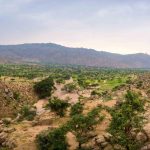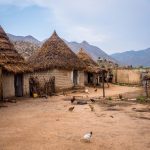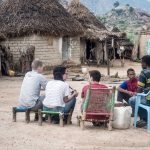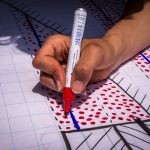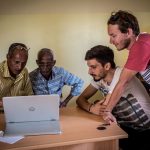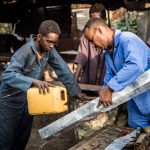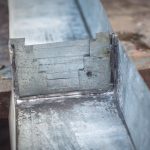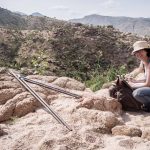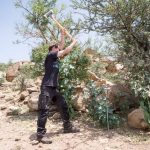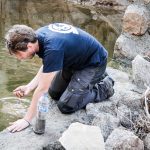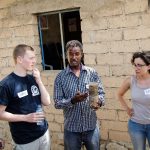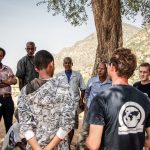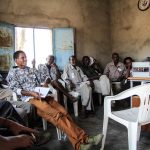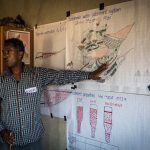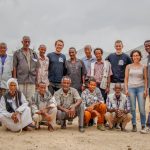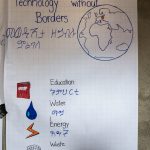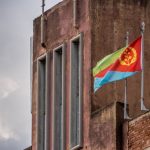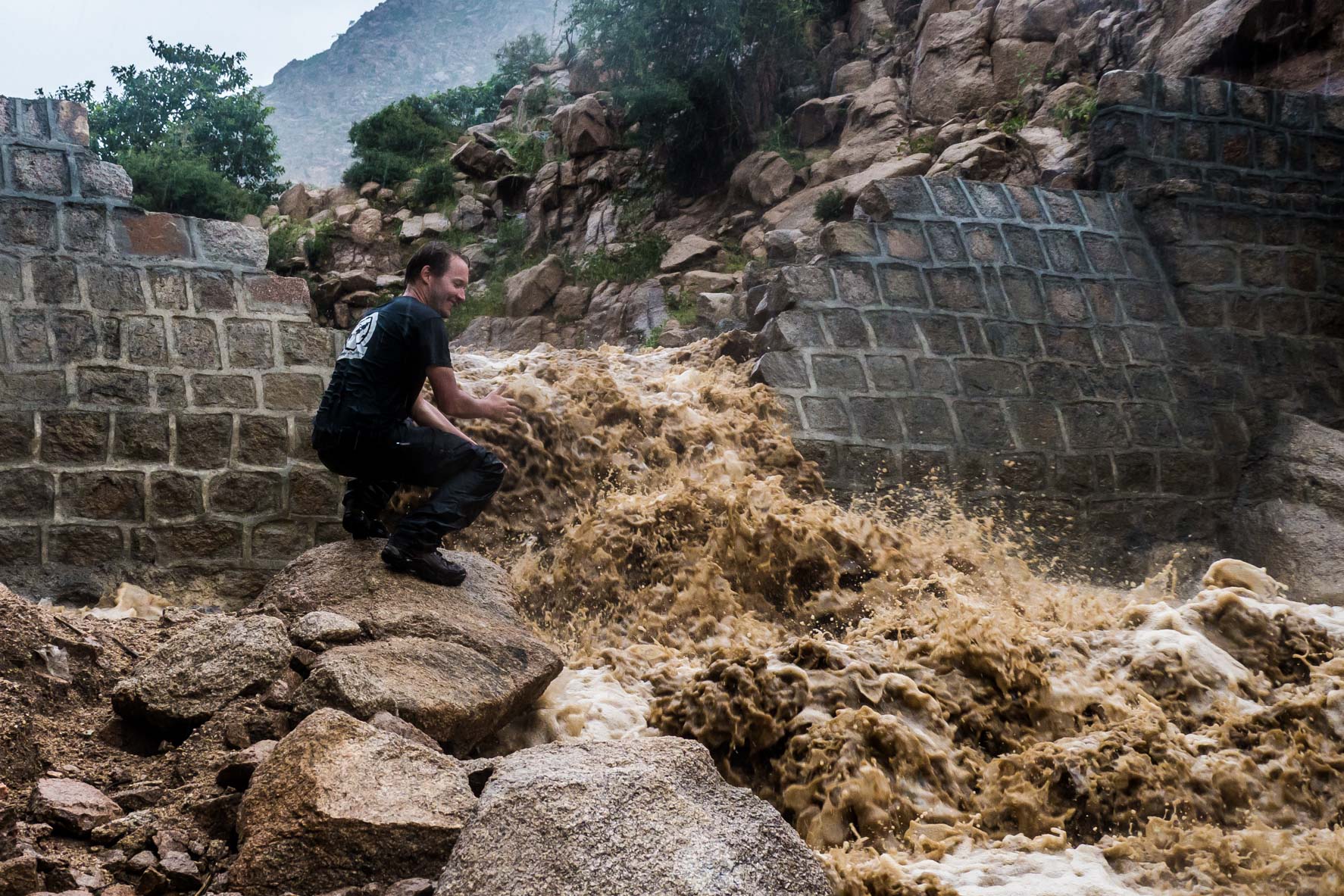
Travel Report – Sand Storage Dams in Eritrea, September 2017
Dear friends,In September 2017 we travelled to Eritrea to visit our project, and we want to share now our experiences and accomplishments with you.
Upon arrival in the capital Asmara, we met with our project partners to discuss the status quo and the future development of our project. Furthermore, we had the chance to exchange experience and methods of operation with high-ranking governmental officials regarding sustainable water and energy projects. After a couple of days in the beautiful city of Asmara, we continued to Keren and Begu Valley, where our construction site is situated.
At the time of our visit, it was the end of the rainy season. This year, the rainy season is said to have started late and been relatively weak. Nonetheless, the construction workers were already able to construct the foundation and the first stage of the spillway and raise the wing walls up to about three meters. Also, although still being in the first phase of construction, the dam already leads to some catchment that the villagers can use for their daily water supply, and which shortens their ways for fetching water at least during the beginning of the dry season.
Once in Begu and after climbing the hillside of the valley for a short while, we got a first glance on the sand storage dam. This was the first time for us to see the construction, whose implementation was finally started by our Eritrean partners this very summer. Seeing the efforts of the last five years materialised, constituted a very meaningful moment for our group.
In the village close to the site, we were met with great hospitality as we were invited for traditional meals and coffee ceremonies on multiple occasions. This was a very pleasant aspect of our journey, as we were able to get to know the community better and gain an insight into their daily life. The villagers expressed openly their acknowledgement for the project, as they are highly dependent on the prospective water supply from our dam-to-be. This was a welcome confirmation of our efforts and of the meaning of this water supply project.
An important part of our work in Eritrea is the establishment of contacts and the manifestation of the cooperation between Technology without Borders and involved stakeholders. We met regularly and discussed with the engineers, who are inflicted with the construction process. We came to terms regarding technical details of the construction and settled further details regarding the provision of cement, financial reporting and communication. It was very confirmative to see their personal efforts and involvement with this project. It was also interesting and important to gather information about other projects that are being carried out by engineers of the Zoba Anseba, the first-order administrative division in Keren.
In Keren, we were introduced to staff of the Catholic Eparchial Secretariat of Keren (CESK), who are constructing a dam which is situated upstream of our sand storage dam, and who are conducting many more water supply and education projects in the region. We introduced them to the technique of sand storage dams and agreed on the importance of future coordination in the shared project area to secure a successful implementation of the respective projects, which both aim at ending the water shortage of the villagers as soon as possible. We also met with the staff of the Agricultural Department of the Zoba Anseba and Mr. Semere, Dean of the Hemelmalo Agricultural College, to get an insight into their approach to soil stabilisation measures and to establish the contact for further cooperation. Soil stabilisation measures such as terracing, the construction of check dams, and reforestation will be an important task we will have to tackle within a follow-up project in order to develop a sustainable water catchment system and to secure the longevity of the dam structure. Hence, we already conducted a first exploration of the construction site regarding the soil surface and current vegetation. This information can be used to analyse suitable measures for soil and water conservation and serve as reference for future developments.
As conducted during previous journeys, we took water samples from various sources in Begu valley that are being used by the local community. We carried out water quality tests and analysed the results together with Mr. Zere, head of the Water Resource Department in the Zoba Anseba. Our aim is to supervise the water quality on a long term to identify potential risks resulting from high bacterial contamination. Mr. Zere was instructed in the usage of our water testing kit that we later handed over to him. He intends to use this kit to analyse further sources in order to supervise them and, if necessary, take suitable counter-measures. The main result of the testing was that the water from comparable sand storage dams has a better quality than water from open sources. These results again support the idea of a sand storage dam, which diminishes the amount of contamination through a natural filtration system.
During our time in Begu, we also carried out a workshop, where we handed out eight cameras to villagers of different age, gender and role in the society. We asked them to capture every facet of water usage in their daily life. A few days later, we discussed the resulting pictures and the significance of water supply and water quality for different activities. Thus, we got a more intimate insight into the path of water in Begu and the people’s daily routines involving water usage, as well as into important issues like hygiene and saving water.
All in all, are very content with the achievements made during this trip. It was great to witness the implementation, which finally derived from your support and our efforts. Now, we are working towards the next phase of construction, keeping up the good communication with our Eritrean partners from far-off Germany.
Thank you for your enduring support, we are looking forward to report to you from the up-coming construction process.
- Group of TeoG and local engineers
- View into Begu Valley after rainy season
- TeoG Dam Construction Site
- TeoG Dam construction status
- Overview of Begu Valley
- Evaluation of further Dam projects
- Technical discussion in riverbed
- Water supply taps
- Analysis of riverbank
- Often water transport is also managed by children over long distances
- Water collection point at bottom of riverbed
- Loading of donkey with Jerrycan full of water
- Water quality analysis
- Water test with field equipment
- Villagers gave a warm welcome in Begu Valley
- Eritrean traditional coffee ceremony
- Rain event at the TeoG Dam construction
- Sedimentation of coarse sand
- View into Begu Valley
- Village
- Invitation to dinner in one of the villages
- Preparation of technical workshop
- Discussion with stakeholders of the Catholic church
- Construction of material for technical workshop
- Riverbed SSD Model for experiment
- Preparation of probing of embankments
- Probing of underground horizons of riverbed section
- Partly filled reservoir – Fine soil accumulation
- Experiment during technical workshop
- Technical workshop together with local water committee
- Technical workshop together with local water committee
- Explanation of our vision for a future sustainable water supply system
- Workshop participants
- TeoG introduction slide
- Eritrea Flag in Capital Asmara
Text: marius.koenig

